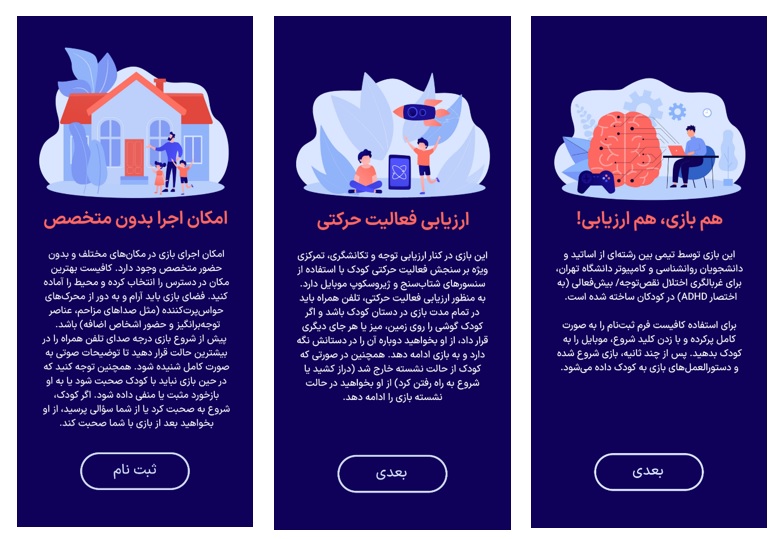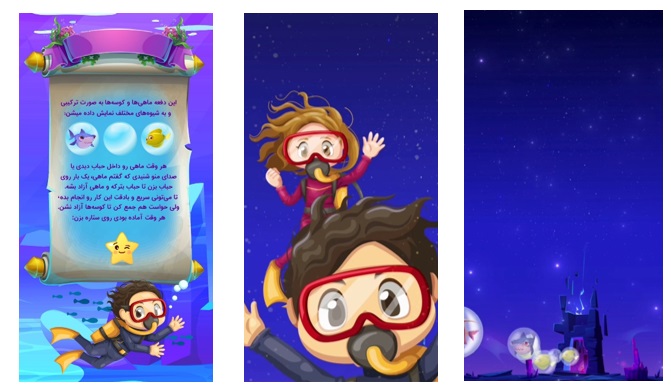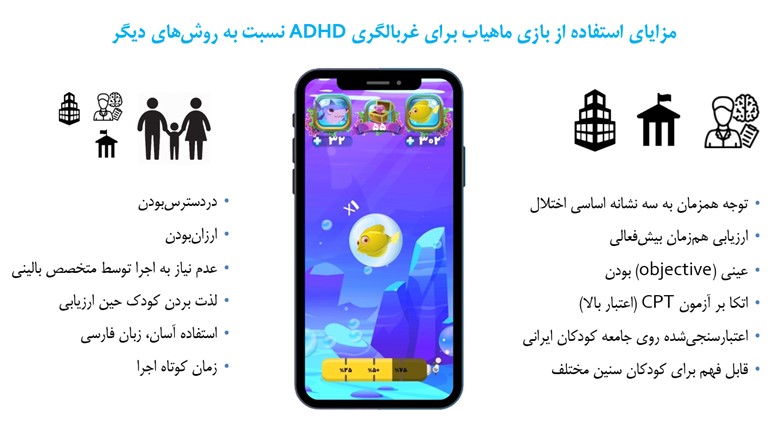Fish Finder: A Machine Learning-Based Mobile Game for Screening Attention-Deficit/Hyperactivity Disorder in Children

Attention deficit/hyperactivity disorder (ADHD) is one of the most common neurodevelopmental disorders in childhood. A 2015 meta-analysis on the global prevalence of ADHD estimated the prevalence of this disorder to be 7.2%. A meta-analysis conducted in Iran in 2019 also estimated the average prevalence of ADHD in Iran to be 8.7%.
The three core symptoms of this disorder include inattention, hyperactivity, and impulsivity. Children with ADHD face numerous problems, such as forgetfulness, distractibility, lack of concentration, restlessness, and impulsivity, which severely affect various aspects of their lives and entail serious harm to the patient, their family, and society. These include poor school performance and academic achievement, problems interacting with parents and other family members, rejection by peers, low self-esteem, and difficulty regulating emotions. If not diagnosed and treated early these problems persist into adulthood and significantly impact the individual's life during this period as well. For instance, these individuals exhibit marked deficits in educational and occupational functioning and experience higher levels of unemployment. They also demonstrate impaired family functioning, seen in higher rates of separation, divorce, and child-rearing problems, increased risk of accidents and driving violations, high-risk sexual behaviors, social and legal problems, and even increased suicidality.
Early treatment during childhood can alleviate many of the problems caused by this disorder and substantially improve the individual's quality of life. Due to greater brain plasticity and more extensive compensatory abilities at younger ages, earlier diagnosis and treatment yield better outcomes, preventing the development of persistent abnormal behaviors and symptoms in the individual. Therefore, it is critically important to identify ADHD as early as possible to initiate treatment.
However, large-scale screening and assessment of the symptoms of this disorder in children pose significant challenges. For instance, there is a lack of specialists to diagnose ADHD in underprivileged areas and among lower socioeconomic status groups. Hence, developing automated screening tools for ADHD that can be utilized in the absence of a specialist facilitates overcoming this barrier.
Additionally, one of the greatest challenges with ADHD is the subjective nature of referrals, assessments, and diagnoses, meaning that in many cases, the clinician's diagnosis relies on records reported by the child's parents and teachers via questionnaires rather than the child's actual performance. This can lead to the overdiagnosis or underdiagnosis of this disorder in children and adolescents, as well as disagreement among professionals regarding the diagnosis. Consequently, objective methods for assessing the symptoms of this disorder have garnered increasing attention in recent years.
Given the aforementioned issues, including the high prevalence of ADHD, the need for early diagnosis, the subjectivity of the diagnostic process and disagreement among specialists, as well as the shortage of specialists in deprived areas, striving to develop an accurate, objective, replicable, agreed-upon and accessible method for screening and assisting in the diagnosis of ADHD symptoms is an essential step. Moreover, considering the widespread use of personal computers and smartphones in society today computer and mobile games have good potential for assessing cognitive processes and dysfunctions as part of large-scale screening of disorder. This approach can increase user engagement and motivation.
In this study, using the three core symptoms of ADHD - inattention, impulsivity, and hyperactivity - a machine-learning-based mobile game called FishFinder has been designed and validated. Using motion sensors (accelerometer and gyroscope) in mobile phones, this game also evaluates players' motor activity during gameplay.

Game Design:
The FishFinder game is inspired by one of the most well-known neuropsychological tests for assessing ADHD, the integrated visual and auditory continuous performance test (IVA-2). The game incorporates various gamification elements, including cohesive graphics and theme, storyline, animations, avatars, feedback system, scoring, and time pressure to engage children in cognitive assessment through gameplay with minimal stress or fatigue.
The story of the FishFinder game, which is initially presented to the child as a one-minute animation at the beginning of the game, is as follows: The sibling divers named Sarah and Soheil have gone into the depths of the sea to collect pearls, oysters, and diamonds. Suddenly, they hear voices asking them for help. The creatures seeking help are fish that a group of sharks is chasing. Sarah and Soheil decide to help the fish, so they follow them when they suddenly encounter a strange scene. The quickly fleeing and chasing fish and sharks accidentally enter a strange gateway, getting trapped in bubbles as they pass through. Sarah and Soheil, along with the player's participation, decide to go help the fish and get them out of the bubbles. But the main challenge they face is to focus on not freeing the sharks by accident.

Game Validation:
This game was validated in a university thesis on 52 children aged 5-12 years (26 children with ADHD and 26 healthy children matched by age and gender), and results showed the FishFinder game had an overall accuracy of 92%, sensitivity of 90%, and specificity of 94% in distinguishing ADHD children from healthy children. It demonstrated a high capability to serve as an inexpensive, scalable, objective, accessible, and, at the same time, an appealing method for screening for ADHD in children.

Potential Customers for FishFinder Game:
- Government centers such as the Ministry of Health and Ministry of Education
- Private centers such as clinics, counseling centers, and private schools
- Clinical specialists, especially psychologists and psychiatrists
- Parents and families
Members: Dr. Hadi Moradi - Dr. Sogand Ghasemzadeh - Zeinab Zakani - Maryam Riazi - Fatemeh Mortazavi
papers:
- Zakani,Z, Moradi, H, Ghasemzadeh, S., Riazi, M., & Mortazavi, F. (2023). A novel gamified approach for objective screening of Attention-deficit/hyperactivity disorder in children. 12th Basic and Clinical Neuroscience, Tehran, Iran.
Honors:
- FishFinder was awarded as a selected game by the Center for the Intellectual Development of Children and Teenagers at the 6th Serious Game Festival, 2023.
- Second place awarded by the Cognitive Sciences and Technologies Council at the 6th Serious Game Festival, 2023.
More...
